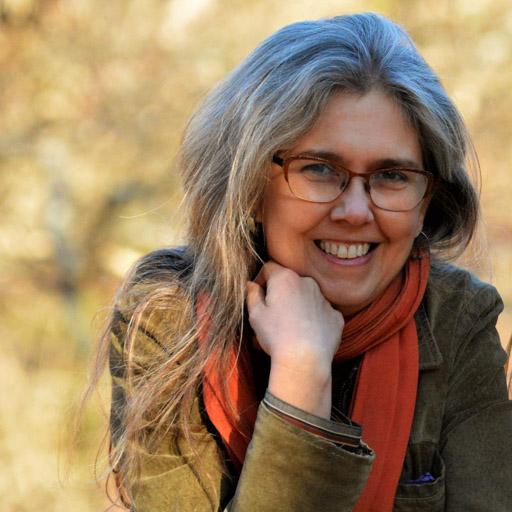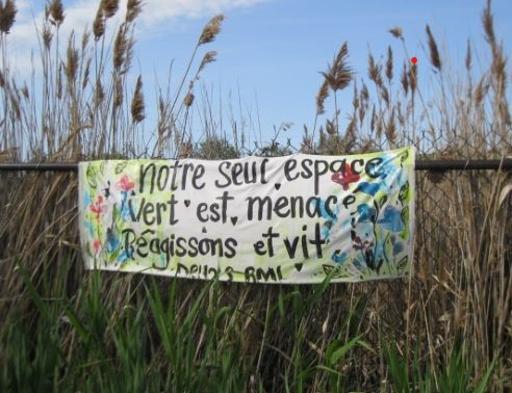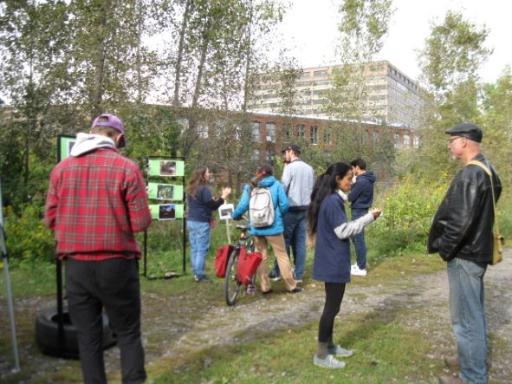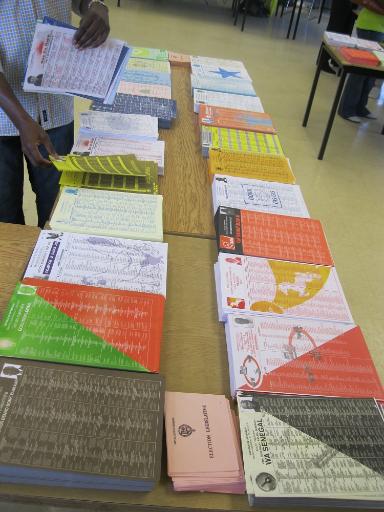
M. Petteys
Amy R. Poteete
Thesis supervisor Accepting inquiries
- Associate Professor, Political Science
- Undergraduate Program Director, Political Science
Are you the profile owner?
Sign in to editThesis supervision details
Supervised programs: Political Science (MA), Political Science (PhD), Individualized Program (PhD)
Research areas: Comparative Politics; Policy; Africa; natural resources; (de)centralization; elections; social justice and inclusion; research design
Contact information
Biography
Amy R. Poteete’s research explores socio-ecological and political economic relations in diverse contexts, ranging from Botswana and Sénégal to Montréal and southern Indiana (USA). She is currently working on issues related to commoning and social inclusion in four informal urban green spaces in Montreal: the Champ des Possibles in Mile End; a complex of sites including Boisé Steinberg, Boisé Vimont, and a friche in Hochelaga; the Falaise St. Jacques in Notre Dame de Grace/Sud-Ouest, and the Technoparc wetlands near St. Laurent. Poteete has written extensively on decentralization-centralization, the political economic of development, and electoral politics, particularly in Botswana and Senegal. Another strand of writing concerns methodological issues. She is the coauthor, with Marco A. Janssen and Elinor Ostrom, of Working Together: Collective Action, the Commons, and Multiple Methods in Practice (Princeton University Press), which has been translated into Chinese, Spanish, and Portuguese. She received the Dudley Seers Memorial Prize for best article in volume 45 of the Journal of Development Studies for her article, “Is Development Path Dependent or Political? A Reinterpretation of Mineral-Dependent Development in Botswana” (April 2009). Other publications include chapters in edited volumes and articles in a variety of journals,including African Affairs, Development and Change, Electoral Studies, the Journal of Development Studies, the Journal of Modern African Studies, and World Development.
Education
PhD (Duke University)
Research interests
Social, political, economic, and ecological interactions; commons and commoning; informal urban green spaces; social mobilization; Montreal; political economy of low and middle income countries; African politics, decentralization
Research affiliations

"Our only green space is threatened. Let's react & fast. Out RML." Hochelaga, May 2022
A. Poteete

Collaborative consultations, Champs des Possible, 2022
A. Poteete

Absentee voting for Senegalese legislative elections of 2012 in Montreal
A. Poteete
Teaching activities
POLI 327 Comparative Democratization
POLI 366 Politics of Africa
POLI 410 Environmental Policies in the Developing World
POLI 487D Decentralization and Development
POLI 489/683 Social Research in Urban Green Spaces
POLI 601/844 Research DesignPOLI 636/805 Theories of Public Policy and Public Administration
POLI 683/815 Development Policy and Administration
Research activities
“Supporting the Possibilities of Urban Commoning in Montreal’s Champ des Possibles.”
Social Sciences and Humanities Research Council (SSHRC) of Canada Partnership Engagement Grant (892-2019-2045). December 2019 – November 2022. [Extended in response to Covid-2019].
Co-applicant: Nik Luka (McGill University).
Partner organization: Les Amis du Champ des Possibles.
Enhancing biodiversity, social inclusion, and climate resilience through informal urban green spaces
Sustainable Transitions Team Research Initiative, Office of Vice President, Research and Graduate Studies, Concordia University, 2022– 2024.
Co-investigators: Emma Despland, Elizabeth (Liz) Miller, Rebecca Tittler, and Carly Ziter, all at Concordia University
Partners: Les Amis du Champ des Possibles, Mobilisation 6600, Sauvons la Falaise, Technoparc Oiseaux, and UrbaNature Education
Summary
In spaces that officials and investors consider wastelands ripe for new development, urban residents frequently see considerable value. These spaces become entangled with residents’ sense of place and community, offer respite from the heat and bustle of the city, and are perceived as providing habitat and refuges for biodiversity. If mobilization to care for and protect informal urban green places reflects intense social attachments to them, the contributions of these spaces to terrestrial ecosystems and to climate resilience are less obvious. After all, informal green spaces tend to cluster in (former) industrial spaces, along transportation infrastructure, and at the socioeconomic margins of the city. Far from being pristine, the ecosystems in these locations have been deeply and repeatedly fragmented, disturbed, and, often, contaminated. While a growing body of research demonstrates that informal urban green spaces can nonetheless contribute to sustainability (e.g., Albro 2019; Anderson & Minor 2021; Turo et al. 2021), many questions remain unanswered about whether and when they do so in practice. We propose to (1) pilot methods to evaluate the contributions of informal urban green spaces to biodiversity (SDG 15), social inclusion (SDG 11), and climate resilience (SDG13); (2) assess the applicability of these methods across four informal greenspaces in Montreal with diverse socio-ecological characteristics (Falaise St.Jacques, Technoparc, Champ des Possibles, Boisé Vimont); and (3) engage urban residents in collaborative learning and reflection in collaboration with community partners. Our longer term objectives of (1) evaluating the contributions of informal urban green spaces to biodiversity, social inclusion, and climate resilience; (2) analyzing relationships among various ecological, social, and climate buffering traits of these sites; (3) raising awareness of the social as well as ecological values of these spaces; and (4) identifying ways to enhance their contributions to socio-ecological sustainability.
Selected Publications
Books
Poteete, Amy R., Marco Janssen, and Elinor Ostrom. 2010. Working Together: Collective Action and the Commons, and Multiple Methods in Practice. Princeton, NJ: Princeton University Press.
Articles
Poteete, Amy R. and Jesse C. Ribot. 2011. “Repertoires of Domination: Decentralization as Process in Botswana and Senegal.” World Development 39, no. 3 (March): 439-449. http://doi.org/10.1016/j.worlddev.2010.09.013
Poteete, Amy R. 2009. "Is Development Path Dependent or Political? A Reinterpretation of Mineral-Dependent Development in Botswana," Journal of Development Studies 45, no.4 (April): 544 - 571. Recipient of the Dudley Seers Memorial Prize recognizing the best article published in the Journal during 2009 (Volume 45). https://doi.org/10.1080/00220380802265488
Poteete, Amy R. 2009. "Defining Political Community and Rights to Natural Resources in Botswana," Development and Change 40, no.2 (March): 281 - 305. DOI:
Poteete, Amy R. and Elinor Ostrom. 2008. “Fifteen Years of Empirical Research on Collective Action in Natural Resource Management: Struggling to Build Large-N Databases Based on Qualitative Research,” World Development 36, no. 1 (January): 176 - 195. http://dx.doi.org/10.1016/j.worlddev.2007.02.01]
Poteete, Amy R. and Elinor Ostrom. 2004. "Heterogeneity, Group Size and Collective Action: The Role of Institutions in Forest Management," Development and Change 35, no. 3 (June): 437 – 461. https://doi.org/10.1111/j.1467-7660.2004.00360.x
Poteete, Amy R. and David Welch. 2004. "Institutional Development in the Face of Complexity: Constructing Systems for Managing Forest Resources," Human Ecology 32, no. 3 (June): 279 - 311. https://doi.org/10.1023/B:HUEC.0000028083.29437.ac
Chapters
Poteete, Amy R. 2019. "The Capacity of Decentralization to Promote Democracy and Development in Africa," In Oxford Research Encyclopedia of Politics. New York: Oxford University Press. http://dx.doi.org/10.1093/
Poteete, Amy R., Bashi Mothusi,and Daniel Molaodi. 2014. “Decentralization in Botswana: Political and Economic Obstacles to Democratic Decentralization,” pp. 23 – 43 in J. Tyler Dickovick and James Wunsch, eds., Decentralization in Africa: The Paradox of State Strength. Boulder, CO: Lynne Rienner Publishers.
Poteete, Amy R. 2013. “The Absence of Inter-Group Violence in Botswana: An Assessment of the Role of Development Strategies,” pp. 183 – 219 in William Ascher and Natalia Mirovitskaya, eds., Economic Roots of Conflict and Cooperation in Africa. Palgrave Macmillan.
Poteete, Amy R. 2010. “Analyzing the Politics of Natural Resources: From Theories of Property Rights to Institutional Analysis and Beyond,” pp. 57 - 79 in Ismael Vaccaro, Eric Alden Smith, and Shankar Aswani, eds., Environmental Social Sciences: Methods and Research Design. Cambridge,UK: Cambridge University Press.
Participation activities
Conference participation (selected)
Poteete, Amy R., Pavel Kunysz, and Nik Luka. 2024. “Commoning with and against Commoning: A Tale of Two Contested Green Spaces in Montreal.” Presented by Amy Poteete at the annual meeting the American PoliticalScience Association, 5 – 8 September 2024, Philadelphia, USA.
Poteete, Amy R. and Nik Luka. 2024. “Commoning as ‘Caring With.’” Presented by Amy Poteete as part of a virtual panel on “Caring with and against Commoning” at the annual meeting of the Association of American Geographers, 16– 20 April 2024, Honolulu, USA.
Poteete, Amy R., Pavel Kunysz, and Nik Luka.2023. “Is Commoning Compatible with Heterotopia: Reflections from Montreal’s Champ des Possibles.” Presented by Amy Poteete as part of a hybrid panel at the annual meeting of the Association of American Geographers, 23 – 27 March 2023, Denver, USA.
Despland, Emma, Elizabeth Miller, Amy R.Poteete, and Carly Ziter. 2023. “Forgotten Green Spaces of Montreal: The value of Montreal’s unofficial parks.” Panel discussion at the 2023 Sustainability across Disciplines conference, 13 – 17 March 2023, Loyola College for Diversity and Sustainability and the Loyola Sustainability Research Centre (LSRC), Concordia University, Montreal, Canada.
Poteete, Amy R., Nik Luka, Clément Badra, and Valentina Samoylenka. 2021. “Occupying, Caring for, and Commoning Urban Public Space in Montréal’s Champ des Possibles.” International Association for the Study of the Commons 2021 Urban Commons Virtual Conference, 6 – 8 May 2021. Video: https://youtu.be/I05Nq_5WzU0and https://www.youtube.com/watch?v=6N5R2UN7X5o.
Poteete, Amy R. 2020. “Urban Commoning. ”Invited participant in a panel discussion on “New Commons” at the Governing the Commons: Thirty Years Later Conference, 2 October 2020. A virtual conference organized by the Ostrom Workshop, Indiana University, USA. Video available online; my contribution begins at 2:51:41: https://www.youtube.com/watch?v=JdLO8-hHolw
Research workshops (selected)
Poteete, Amy R. 2024. “Worth Defending: Biodiversity, Climate Resilience, and Social Inclusionin Montreal’s (Extra)ordinary Green Spaces,” presented at “Buildingsustainable cities: The politics of provision, implementation and management,” an American PoliticalScience Associationpre-conference short course (workshop), 4 September2024, Philadelphia, USA.
Organizer, moderator, and participant, “Working together for Montreal’s (extra)ordinary green spaces / Travailler ensemble pourles espaces verts (extra)ordinaires de Montréal,” a workshop involving members of the “Enhancing Biodiversity, Social Inclusion, and Climate Resilience through Informal Urban Green Spaces” research team and five community partners, Next Generation Cities Institute, Concordia University, 12 March 2024.
Membre du comité scientifique, “Les mondes du terrain vague. Usages et résistance,” an interdisciplinary colloquium organized by Estelle Grandbois-Bernard, Joris Maillochon,Simon Marcoux-Piché, and Annabelle Rivard Patoine in collaboration with Stasis- Groupe d’enquête sur le contemporain ; le Centre de recherche Cultures – Arts– Sociétés (CELAT) ; le Groupe de Recherche d’intérêt Public, Université du Québec à Montréal (GRIP – UQAM) ; et Mobilisation 6600, 2 – 3 juin 2023, Boisé Steinberg, Montréal, Canada.
Poteete, Amy, Pavel Kunysz, and NikLuka. 2023. “Commoning, Heterotopia, and Transformation: An Analytical Framework.” Paper presented by Amy Poteete at the “Commons, Commoning, and Social Change” workshop, University of Michigan, USA, 11 – 12 November 2023.
Exhibitions and Events
“Worth Defending: Montreal’s(extra)ordinary green spaces / À defendre : les espaces verts (extra)ordinaires de Montréal,” 4th Space, Concordia University, 27 January 2024. A day-long event exhibiting preliminary research findings from “Enhancing Biodiversity, Social Inclusion, and Climate Resilience through Informal Urban Green Spaces” research team, artifacts from the “Finding Urban Nature” team’s nature education work with summer day camps, and materials from partner organizations. There were also interactive demonstrations and a panel discussion, which can be viewed online: https://www.youtube.com/watch?v=50fzp3m29mk
Amy Poteete. 2024. “Is Wildlife Conservation Sustainable,” TEDxConcordia event “Looking Beyond,” Concordia University, 5 March 2024: https://www.youtube.com/watch?v=k7qK0FnVCf8
Panelist in a walk/roundtable organized for the opening of “Écotones: Investigations expérimentales et activation de sols contaminés au Champ des Possibles,”organized by Brice Ammar-Khodja and Philippe Vandal in the Champ des Possibles, 14 October 2022. Spoke about social activities in the Champ des Possibles, the site's social significance, and the challenges diverse values pose for cohabitation. For more information: https://hexagram.ca/en/demo28-brice-ammar-khodja-et-philippe-vandal-ecotones/
Luka, Nik, Amy Poteete, Giacomo Valzania, and Karlo Trost. 2022. “Le Champ des Possibles et ses alentours/The Champ des Possible and its milieu.” Promenade de Jane/Jane’s Walk, animation of one walk each in English and French, on 8 May 2022.
Videos and recordings
Worth defending: La Falaise St. Jacques
Available online: https://soundcloud.com/wastescape/worth-defending-la-falaise-st-jacques
Agency in Urban Greenspaces: How to get involved in local conservation / Agentivité dans les espaces verts urbains: Comment s’impliquer dans la conservation locale
Is Wildlife Conservation Sustainable?
There is growing evidence of an accelerating global extinction crisis, which scientists as well as environmental activists refer to as the Sixth Mass Extinction. Where past mass extinctions were the result of natural processes, human activity is the main driver of the current crisis. The situation calls for urgent action. Conservation policy is, however, highly contentious and policies adopted in the name of conservation are often ineffective or even counterproductive. In this TEDxConcordia talk, Amy Poteete highlights some of the tensions and challenges associated with wildlife conservation through a recounting of Botswana’s experience with a wildlife hunting ban, in effect from 2014 through 2019. Introduced during the presidency of Ian Khama, an internationally recognized conservationist, the hunting ban reinforced long-standing measures to criminalize subsistence hunting and combat poaching.It also undermined the logic of community-based natural resource management, an approach introduced in the 1990s to create material incentives for people in wildlife rich areas to protect wildlife. Since lifting the ban, Botswana has embraced a use-based conservation strategy. While coercive exclusion of human uses is counterproductive, trying to protect wildlife and other forms of biodiversity by emphasizing its material benefits also has important limitations. What are the alternatives?
TEDxConcordia talk delivered on 5 March 2024 and posted online on 12 March 2024: https://www.youtube.com/watch?v=k7qK0FnVCf8
Worth Defending: Montreal’s (extra)ordinary green spaces / À defendre : les espaces verts (extra)ordinaire de Montréal


